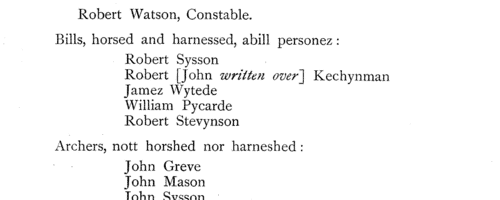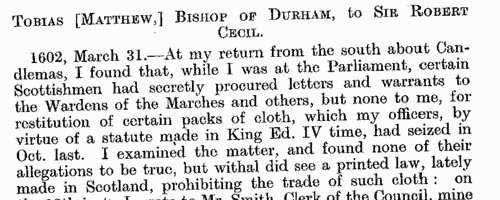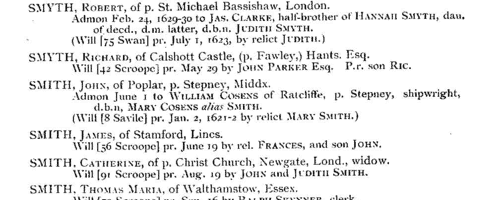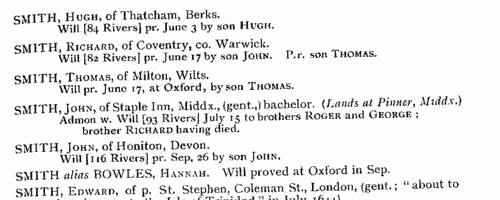Halles Surname Ancestry ResultsOur indexes 1000-1999 include entries for the spelling 'halles'. In the period you have requested, we have the following 16 records (displaying 1 to 10): Buy all | | | Get all 16 records to view, to save and print for £76.00 |
These sample scans are from the original record. You will get scans of the full pages or articles where the surname you searched for has been found. Your web browser may prevent the sample windows from opening; in this case please change your browser settings to allow pop-up windows from this site. Northumberland Assize Rolls for the General Eyre
(1256-1279)
The royal justices made periodic general eyres through all the shires of England, hearing civil and criminal cases that had accrued from the lower courts. Here we have the assize rolls of three Northumberland eyres, 24 April to 7 May 1256; 25 June to 15 July 1269; and 20 January to 9 February 1279. The bulk of the text relates to civil pleas from the county of Northumberland and the town of Newcastle upon Tyne; finishing with abstracts of the pedes finium, or feet of fines (lawsuits or pretended lawsuits establishing the ownership of land) arising at the three eyres. But there are also criminal cases (as in the scan here), lists of bailiffs, &c.HALLES. Cost: £4.00.  | Sample scan, click to enlarge

| Kirkstall Abbey Billmen
(1539)
In anticipation of war with France, Henry VIII ordered a general muster of able-bodied men throughout the kingdom. That for the wapentake of Skyrack, in the West Riding of Yorkshire, took place at Wike (near Leeds) before sir William Gascoigne the elder, sir William Middleton and sir William Maleverer, on 26 March 1539. Skyrack wapentake consisted of the ancient parishes of Aberford, Adel, Bardsey, Barwick in Elmet, Bingley, Collingham, Garforth, Guiseley, Harewood, (part of) Ilkley, Kippax, Otley, Swillington and Thorner, as well as the borough of Leeds. This muster roll listing the archers, billmen and spearmen of the wapentake by township or constablewick, was preserved among the State Papers in the Public Record Office; it was edited by W. Paley Baildon, and printed in three issues of the Miscellanea of the Thoresby Society (volumes 4 and 9) through to 1899. For each township there is a list of archers, divided into those fully and those partly ('parcel') armoured ('harnessed'), and a similar list of billmen; a few spearmen also appear. The weapon of the billmen - the bill or halberd - was a blade with a long wooden handle, sometimes with a hook with a cutting edge added at one side.
HALLES. Cost: £6.00.  | Sample scan, click to enlarge

| Tenants, founders and incumbents of Yorkshire chantries
(1546-1548)
Chantries were established to perform services for the souls of their founders and other faithful dead, including annual obits and anniversaries at which alms were usually distributed. The chantries could be at an existing altar in a parish church, a new altar in a side chapel of an existing church, in a new chapel in the churchyard or some miles from an existing church: few were founded before 1300, and most date from 1450 to 1500. Hospitals were places provided by similar foundations to receive the poor and weak; there were also religious guilds, brotherhoods and fraternities, and colleges (like large chantries at which three or more secular priests lived in common). An Act of Parliament of 1545 gave king Henry VIII the power to dissolve such chantries, chapels, &c., the proceeds to be devoted to the expenses of the wars in France and Scotland. Commissioners were appointed 14 February 1546 to survey the chantries and seize their property, and from 1546 to 1548 the commissioners produced these certificates giving brief details of the establishment and nature of each foundation, with an inventory of valuables and rental of lands. The individuals named in the certificates are thus the founder, the present incumbent, and the tenants whose rents provided the chantry's income. All the surviving certificates were edited by William Page for the Surtees Society, and published from 1892.HALLES. Cost: £6.00.  | Sample scan, click to enlarge

| London funerals and other news
(1550-1563)
Henry Machyn was a citizen and merchant-taylor of London. He had a professional interest in the lavish funerals of his fellow citizens, and in October 1550 started a note book giving brief details of these occasions. Soon he added political news, and (in an age before newspapers) he had a journalist's eye for accidents, hangings, the preachings and suppression of heretics, and the fortunes and misfortunes of dissidents. He lived in interesting times; the early death of Edward VI; the failed attempt to install Jane on the throne; the succession of queen Mary, and a lurch towards Catholicism; her marriage to Philip of Spain; her death, and the accession of queen Elizabeth. Machyn's humble journal, written for his own amusement and with a resolute indifference to orthography, became in its time an important historical source, used by Strype, and then edited by John Gough Nichols for the Camden Society and published in 1848.HALLES. Cost: £4.00.  | Sample scan, click to enlarge

| Inhabitants of Suffolk
(1568)
By Act of Parliament of December 1566 a subsidy of 8d in the £ on moveable goods and 4s in the £ on the annual value of land was raised from the lay (as opposed to clergy) population. These are the returns for Suffolk, printed in 1909 in the Suffolk Green Book series.HALLES. Cost: £4.00.  | Sample scan, click to enlarge

| Secretary of State's Papers
(1602)
The letters and papers of sir Robert Cecil, Secretary of State, deal with all manner of government business in England, Ireland and abroad.HALLES. Cost: £4.00.  | Sample scan, click to enlarge

| PCC Probates and Administrations
(1630)
The Prerogative Court of Canterbury's main jurisdiction was central and southern England and Wales, as well as over sailors &c dying abroad: these brief abstracts, compiled under the title "Year Books of Probates", and printed in 1902, usually give address, date of probate and name of executor or administrator. They are based on the Probate Act Books, cross-checked with the original wills, from which additional details are, occasionally, added. The original spelling of surnames was retained, but christian and place names have been modernised where necessary.HALLES. Cost: £2.00.  | Sample scan, click to enlarge

| PCC Probates and Administrations
(1647)
The Prerogative Court of Canterbury's main jurisdiction was central and southern England and Wales, as well as over sailors &c dying abroad: these brief abstracts, compiled under the title "Year Books of Probates", and printed in 1906, usually give address, date of probate and name of executor or administrator. They are based on the Probate Act Books, cross-checked with the original wills, from which additional details are, occasionally, added. The original spelling of surnames was retained, but christian and place names have been modernised where necessary.HALLES. Cost: £2.00.  | Sample scan, click to enlarge

| State Papers Domestic
(1683)
The State Papers Domestic cover all manner of business relating to Britain, Ireland and the colonies, conducted in the office of the Secretary of State, as well as other miscellaneous records. This calendar of the records from 1 January to 30 June 1683 was prepared by F H Blackburne Daniell, and published in 1933. It covers material from State Papers Domestic, Charles II, 359, 422-426; Various 9 and 12; Entry Books 50, 53-57, 63, 66, 68-69, 164, 335; Signet Office 1 vol II; King William's Chest 3; State Papers Scotland Warrant Books 7 and 8; State Papers Ireland 341, 343 and Entry Book 1; State Papers Channel Islands 1; and Admiralty 77 (Greenwich Hospital, Newsletters, Original), 2.
HALLES. Cost: £4.00.  | Sample scan, click to enlarge

| Allegations for marriages in southern England
(1687-1694)
The province or archbishopric of Canterbury covered all England and Wales except for the northern counties in the four dioceses of the archbishopric of York (York, Durham, Chester and Carlisle). Marriage licences were generally issued by the local dioceses, but above them was the jurisdiction of the archbishop, exercised through his vicar-general. Where the prospective bride and groom were from different dioceses it would be expected that they obtain a licence from the archbishop; in practice, the archbishop residing at Lambeth, and the actual offices of the province being in London, which was itself split into myriad ecclesiastical jurisdictions, and spilled into adjoining dioceses, this facility was particularly resorted to by couples from London and the home counties, although there are quite a few entries referring to parties from further afield. The abstracts of the allegations given here usually state name, address (street in London, or parish), age, and condition of bride and groom; and sometimes the name, address and occupation of the friend or relative filing the allegation. Where parental consent was necessary, a mother's or father's name may be given. The ages shown should be treated with caution; ages above 21 tended to be reduced, doubtless for cosmetic reasons; ages under 21 tended to be increased, particularly to avoid requiring parental consent; a simple statement 'aged 21' may merely mean 'of full age' and indicate any age from 21 upwards. These are merely allegations to obtain licences; although nearly all will have resulted in the issuing of the licence, many licences did not then result in marriage. HALLES. Cost: £4.00.  | Sample scan, click to enlarge

|
| 1 | 2 |  |
Research your ancestry, family history, genealogy and one-name study by direct access to original records and archives indexed by surname.
|












